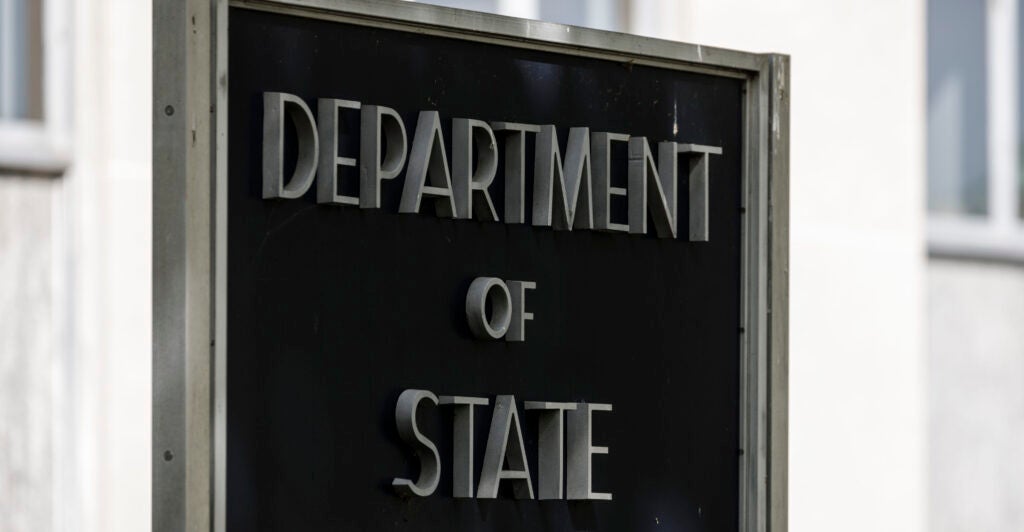A State Department agency with a mission of combating disinformation abroad has helped shape coverage by—and in some cases subsidized—U.S. news outlets, according to records obtained by a conservative legal organization.
America First Legal says that over 600 pages of documents obtained in a public records lawsuit show the State Department’s Global Engagement Center worked with privately owned media organizations to tout government propaganda.
Among those named in the documents are The New York Times, The Washington Post, The Associated Press, The Wall Street Journal, and PolitiFact.
PolitiFact’s parent organization, The Poynter Institute for Media Studies, a journalism group, also is shown to be heavily reliant on the State Department’s Global Engagement Center for funding its International Fact-Checking Network.
America First Legal, founded by former Trump administration officials, on Wednesday released three separate document productions resulting from its lawsuit.
“Over the last two years, we have proven to the American people that there is—in fact—an intricate web of individuals and organizations that influence everything you see presented as objectively ‘true’ or ‘fact’ in the media,” Gene Hamilton, vice president and general counsel of America First Legal, said in a public statement.
“While it is undeniably true that all governments throughout history have conducted campaigns to influence foreign audiences, it is now undeniably true that the same tactics and techniques are being used to influence perceptions amongst the American people domestically,” Hamilton said. “We will continue to expose this influence operation to the American people and to bring accountability where we can.”
The Global Engagement Center’s Information Access Fund appears to pay for the licensing of free content from The New York Times and The Associated Press that is printed in both English and Mandarin for news organizations in the Pacific Islands.
“I am writing to you as the East-West Center is administering a project of the Department of State which provides [a] licensing agreement to use New York Times content in select Pacific Island newsrooms,” says an email from Scott Kroeker, the center’s senior program officer. “The funds are drawn from the GEC [Global Engagement Center] Access Information Fund, which we are accessing through a sub-award with the Institute for War & Peace Reporting.”
The information about subsidies and partnerships for left-leaning news outlets comes after news that the Statement Department funded a group that attacks conservative media.
The Global Engagement Center along with the National Endowment for Democracy—a nonprofit almost entirely funded by the State Department—reportedly gave a combined $330,000 to the British-based nonprofit Global Disinformation Index.
That organization attacks center-right news outlets, including The Daily Signal, the Washington Examiner, and the New York Post, along with Real Clear Politics (which published commentary from both the Right and Left) and a libertarian magazine, Reason.
The documents obtained by America First Legal show one major recipient of funds from the Global Engagement Center has been the Poynter-sponsored International Fact-Checking Network. That network also has been funded by liberal donor organizations that include financier George Soros’ Open Society Foundations, Omidyar Network, Google, Facebook, and the Bill & Melinda Gates Foundation, according to America First Legal.
Neither the Poynter Institute nor the State Department immediately responded to The Daily Signal’s inquiries for this report. The State Department acknowledged receipt of the inquiry, however.
The documents obtained by America First Legal also show how various news organizations—including The Associated Press, USA Today, and The Wall Street Journal—rely on the Global Engagement Center as the final word.
In one example, The Washington Post used the State Department agency to undermine the now famous Hunter Biden laptop story, first reported by the New York Post.
The day the story broke, on Oct. 14, 2020, a Washington Post reporter emailed the Global Engagement Center to ask about having a phone conversation on “more declassified Russian disinformation.”
The next day, The Washington Post ran a news story casting the abandoned laptop and its contents as Russian disinformation and reported: “The Washington Post was unable to verify the authenticity of the alleged communications.”
In the past year, both The Washington Post and The New York Times, as well as other left-leaning news outlets, admitted that the Hunter Biden laptop and its contents were real—after initially trying to discredit or ignore the story in the weeks before the 2020 presidential election.
Have an opinion about this article? To sound off, please email letters@DailySignal.com, and we’ll consider publishing your edited remarks in our regular “We Hear You” feature. Remember to include the URL or headline of the article plus your name and town and/or state.
